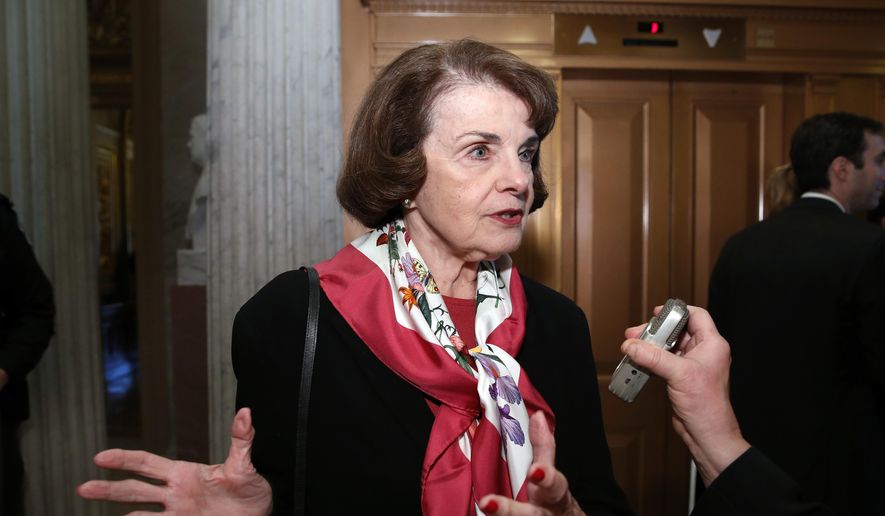The U.S. census asks about age and ethnicity, but doesn’t currently ask residents whether they’re citizens — something the Trump administration wants to change in time for the 2020 count.
Like much of the Trump agenda, it’s not happening without a fight.
The Justice Department’s petition to add citizenship questions to the upcoming census has ignited a firestorm of criticism from immigrant-rights advocates who say immigrants will shun the process if they’re asked to reveal that particular piece of information.
“Such a question would likely depress participation in the 2020 census from immigrants who fear the government could use the information to target them,” wrote Sen. Dianne Feinstein, ranking Democrat on the Senate Judiciary Committee, in a letter signed by her and four of her Democratic colleagues.
“This chilling effect could lead to broad inaccuracies across the board, from how congressional districts are drawn to how government funds are distributed,” the senators said.
The census says some $675 billion, or nearly a fifth of all federal spending, relies on its numbers. The federal government also uses the numbers to dole out seats in the House among the states, which then use the numbers to draw their own lines.
Justice Department officials say they want citizenship information so they can enforce voting-rights laws and shore up confidence in election results.
“In order to assess and enforce compliance with Section 2’s protection against discrimination in voting, the Department needs to be able to obtain citizen voting-age population data,” Arthur E. Gary, general counsel at the justice management division of the Justice Department, wrote in a letter to Census Bureau Acting Director Ron Jarmin.
The Census Bureau hasn’t publicly announced a decision, and did not respond to emails and a phone call seeking comment.
The question had been a part of the census between the 1960s and 2000, but it was removed from the decennial count in 2010 and shifted over to a smaller, in-depth rolling survey known as the American Community Survey. The ACS goes to roughly one in every 38 households every year, compared to the old Census Bureau long form, which surveyed one in six households every 10 years.
Devin M. O’Malley, a Justice Department spokesman, said even the Census Bureau acknowledges the data isn’t precise enough to use in redistricting, and it’s important to have the citizenship question posed on the main form that will cover all Americans.
“The Justice Department is committed to free and fair elections for all Americans and has sought reinstatement of the citizenship question on the Census to fulfill that commitment,” Mr. O’Malley said.
Some researchers support the question being added.
“I mean, basically more information is always better from a researcher’s point of view,” said Steven Camarota, director of research at the Center for Immigration Studies. “And when you look at things like apportioning and redistricting, which rely on census data, those things are always a concern.”
But the request comes in an atmosphere already charged by those opposed to the Trump administration’s demands for stricter immigration laws, and for a tighter screen on voter participation in elections.
While non-citizens aren’t allowed to vote, they are counted in the Census, and congressional districts are doled out among the states based on total population, including legal and illegal immigrants.
Some analysts say that if citizenship is on the form, and immigrants refuse to answer, it could mean states such as California wouldn’t have their full population counted. That, in turn, could mean the state would lose out on a congressional seat it would otherwise get.
Immigrant-rights activists say the communities they represent are already wary.
“Census bureau field representatives conducting other surveys and experiments have reported that they are encountering unprecedented fear among test respondents,” said Arturo Vargas, executive director of the National Association of Latino Elected and Appointed Officials. “Adding a question on citizenship at this time will further exacerbate such fear and distrust in the Census, further risking an inaccurate count.”
Submitting new questions now would also complicate matters and make the census more expensive, critics said.
Usually questions that are included on the long form are vetted and tested for years before the form is finalized, and trying to add a new set of potentially controversial questions this late in the game is problematic, according to Mrs. Feinstein.
Commerce Secretary Wilbur Ross, whose department heads the Census Bureau, told Congress last year that “high levels of mistrust of the federal government” already hamper census workers — and Mrs. Feinstein reminded Mr. Ross of his testimony in the Democratic senators’ Jan. 5 letter.
“Despite its importance, the 2020 census is in trouble,” the senators said. “The addition of a citizenship question would only further exacerbate an already severe obstacle facing an accurate count in 2020.”
• James Varney can be reached at jvarney@washingtontimes.com.




Please read our comment policy before commenting.